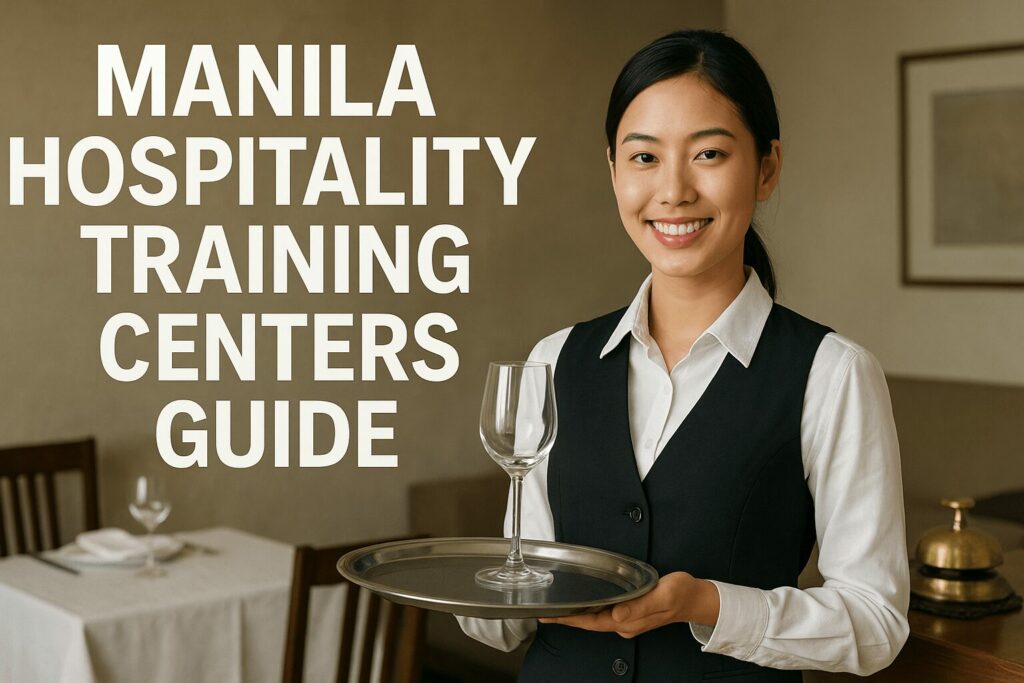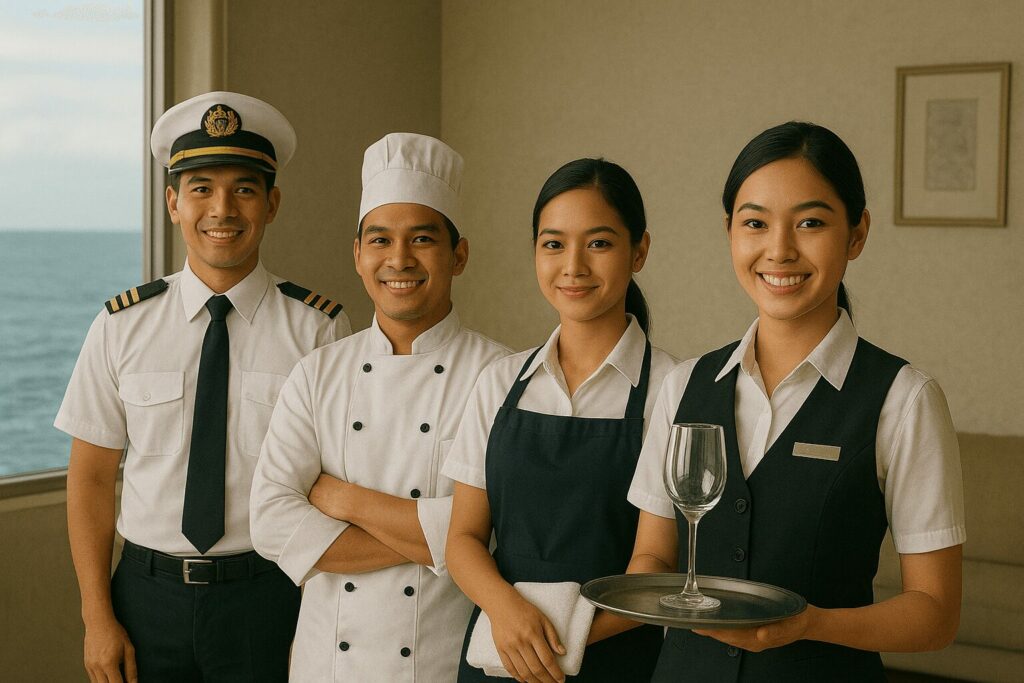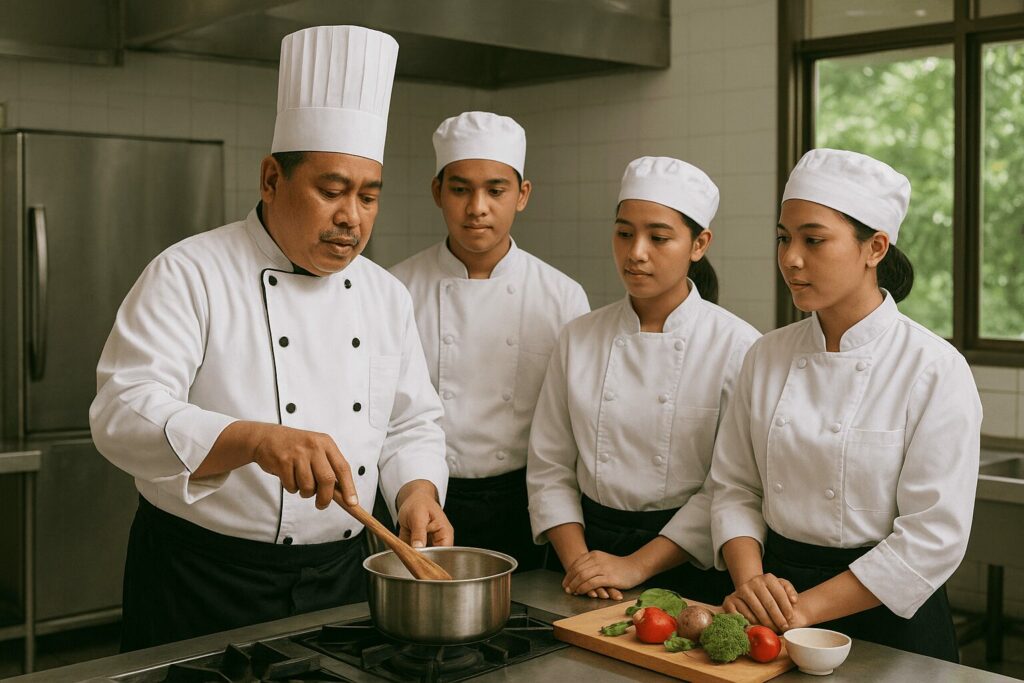
Start Hospitality Career in Manila: Top Training Programs
Feeling lost in the maze of hospitality training centers in Manila options? 🤯 Whether you’re eyeing a career in luxury hotels, buzzing restaurants, or even cruise ships, the overload of choices can be straight-up overwhelming. But here’s the deal: Manila’s hospitality scene isn’t just about glitzy hotels—it’s a global hub for maritime hospitality, too! 🚢 From mastering knife skills in top culinary programs to snagging certifications that open doors worldwide, this guide breaks down how to land the best training, avoid rookie mistakes, and fast-track your career. Spoiler: The Oceanic Hospitality Training Centre’s 80+ programs and hands-on simulations might just be your golden ticket. Ready to dive in Filipino Hospitality trainings programs? Let’s go! 🚀
Hospitality Training centers in Manila Article Takeaways 🇵🇭
Market opportunity: Philippines tourism sector reaching $32.5B by 2033, driving 8.6% of national economy
Program variety: 3-6 month vocational certificates (TESDA) to 4-year degrees (CHED), 200+ training centers in Metro Manila
Maritime specialty: Unique niche in cruise ships/offshore training – Oceanic Centre places 5,000+ graduates annually
Practical approach: Hands-on training in simulated environments + partnerships with luxury brands (Shangri-La, Marriott, Raffles)
Salary progression: Entry-level ₱17-20K/month locally, cruise ship roles ₱35-45K+, international positions pay 2-3x Manila rates
Global mobility: Internationally recognized certifications (TESDA/CHED) open worldwide career opportunities
Table of Contents
- Your ultimate guide to hospitality training in Manila 🇵🇭
- What kind of hospitality training can you find in Manila?
- A Snapshot Of Top Hospitality Training Options In Manila
- How to choose the right hospitality training center for you ✅
- What to expect from your training: skills and learning methods
- Launching your career after your hospitality training in Manila
Your ultimate guide to hospitality training in Manila 🇵🇭
Alright, let’s talk about your future career! Hospitality in the Philippines isn’t just a job—it’s a lifestyle. With Manila’s booming tourism sector hitting $22.1B in 2024 (and climbing to $32.5B by 2033), now’s the perfect time to jump in. But where do you even start? 👀
Manila’s hospitality scene is constantly popular study choice for students, and here’s why: the city’s got everything from 5-star hotels to luxury cruise ships needing skilled workers. Check out this research showing how tourism drives 8.6% of the national economy—it’s not just a trend, it’s a goldmine. ScienceDirect confirms this isn’t just hype.
But with over 200+ training centers in Metro Manila alone, how do you pick the right one? Don’t panic—we’ve done the homework. We’re breaking down the good, the bad, and the « oh wow » options so you don’t waste time. Spoiler alert: some schools even partner with Michelin-starred restaurants. 🤯
Here’s the deal: this article covers culinary programs, hotel management fast-tracks, and tourism certifications. We’ll show you which schools offer 6-month crash courses vs 4-year degrees, where to score scholarships, and how to land those sweet hotel internships. Want to know which programs actually get you hired? We’ve got the inside scoop. Ready to turn your passion into paychecks? Let’s dive in! 💰
What kind of hospitality training can you find in Manila?
A world of options: from culinary arts to hotel management
Manila’s hospitality scene isn’t just about hotels and restaurants. Think of it as a treasure trove of opportunities! You’ll find culinary training for chefs, hotel management for future leaders, and specialized tracks like bartending or housekeeping. The Manila Central University Bachelor of Science in Hospitality Management (4-year/144 credits) even combines business courses with hands-on training in POS systems and event planning. Pro tip: The Philippines has been developing tourism education since 1977 – talk about experience!
Need quick entry? Manila offers 3-6 month certificate programs for bartending or food safety. These bite-sized courses often lead to immediate jobs in local restaurants or hotels. For career climbers, degree holders snag roles like hotel GMs or event planners. Bonus: Many schools offer TESDA certifications (think wine pairing or housekeeping) to boost your résumé!

The maritime hospitality niche: a unique Manila specialty 🚢
Here’s Manila’s secret weapon: maritime hospitality training. This isn’t just cooking on a boat! We’re talking career opportunities on cargo ships, luxury yachts, and offshore rigs. With 70% of Earth covered in water, this specialty offers vast possibilities including 5,000+ annual positions filled by The Oceanic Hospitality Training Centre graduates.
Ever imagined running a ship’s kitchen? The Oceanic teaches everything from ServSafe food safety to Advanced Galley Operations (173.5-hour deep dive into pastry skills!). Their 35-hour Certified Chief Cook program covers nutrition for 3-month voyages – imagine planning meals without refrigeration! Bonus: These certifications open doors to cruise ship jobs paying 2-3x Manila salaries.
Maritime chefs need survival skills: food storage in rough seas, hygiene in compact kitchens, and even basic accounting for onboard stock. It’s a delicate balancing act of logistics, safety, and culinary arts. Pro tip: The Oceanic offers flexible learning – blend online modules with hands-on practice in ship-like kitchens. Their instructors? Real seafarers with 20+ years at sea!
A Snapshot Of Top Hospitality Training Options In Manila
Universities Vs Specialized Training Centers: What’s The Difference?
Alright, let’s break down your options! 🎓 Universities like Manila Central University (MCU) and Philippine Christian University (PCU) offer 4-year Bachelor of Science in Hospitality Management (BSHM) programs. Perfect if you’re eyeing leadership roles with a strong theoretical foundation (think management, HR, and global market strategies). MCU even tosses in certifications for wine & beverages or hotel tech tools – talk about a power move! 💼
Now, if you’re itching to dive into the workforce ASAP, specialized centers like TESDA-accredited Hospitality Institute of America-Philippines Inc. (HIAP) are your jam. Their short courses (like Bartending NC II or Housekeeping NC II) pack a punch with hands-on training in under 400 hours. Imagine mastering cocktail mixes or room prep in months, not years. 🍸🛏️
Still torn? Ask yourself: Do you crave academic deep-dives with research projects (uni path), or prefer getting your hands dirty prepping pastries or serving drinks pronto (vocational route)? The former sets you up for management roles; the latter fast-tracks you into entry-level gigs at Manila’s top hotels. 🚀
Comparing Your Choices: A Handy Table
Let’s make this visual! 📊 Here’s a side-by-side that’ll help you pick your ideal training path:
| Type Of Institution | Best For… | Typical Programs | Key Feature |
|---|---|---|---|
| Universities | Academic paths & high-level management careers | B.S. in Hotel & Restaurant Management, B.S. in Tourism Management, MBA options | CHED-regulated curriculum, ISO-certified, 144+ credit hours of theory + internships |
| Specialized Vocational Centers | Practical skills & quick entry into the workforce | Cookery NC II (316 hrs), Bartending NC II (HIAP), Housekeeping NC II (436 hrs) | TESDA certification, job-ready skills in 5-10 months, affordable fees (₱10,000-50,000 range) |
| Maritime Hospitality Centers | Global careers on cruise ships or offshore rigs | Marine Catering, Galley Operations, Ship’s Cook Certification | Simulated ship environments, TESDA-accredited, 80+ programs for sailors (Oceanic Training Centre trains 5,000+ yearly!) |
Pro tip: Got wanderlust? Maritime programs at Oceanic Hospitality Training Centre include fire safety drills and seafarer health modules – no other Manila school offers that combo! 💥
How to choose the right hospitality training center for you ✅
Check for accreditation: why it’s a non-negotiable
Accreditation isn’t just paperwork—it’s your career safety net. In the Philippines, CHED (Commission on Higher Education) governs college programs, while TESDA regulates vocational courses. These agencies ensure schools meet standards, from curriculums to trainer qualifications. For example, CHED-accredited schools like Polytechnic University of the Philippines offer degree programs with globally recognized hospitality curricula.
Think of international certifications like CHP® (Certified Hospitality Professional) as your global passport. They prove you’ve met rigorous benchmarks, making your resume stand out in Manila’s job market. Without them, you risk wasting time on unrecognized diplomas. For instance, TESDA’s Food and Beverage Services NC III certification is a gold standard for roles like banquet managers.

Facilities and trainers: look for real-world experience
Would you learn to swim in an empty pool? No. Top schools like Oceanic Hospitality Training Centre replicate real environments. Their kitchens and hotel setups mimic actual workplaces. For example, Oceanic’s maritime-focused kitchens mimic cruise ship conditions, preparing you for real scenarios. HIAP Inc.’s luxury hotel mockups let you practice Michelin-level service techniques in a controlled setting.
Trainers matter. At Oceanic, some instructors have sailed for over 20 years. HIAP Inc. partners with brands like Marriott, so trainers share insider tips you won’t find in textbooks. Theory only gets you halfway—hands-on experience finishes the job. Look for instructors with Michelin-star or 5-star hotel experience. At HIAP, trainers include ex-AccorHotels managers who’ve trained staff for Raffles Makati.
The power of hands-on training and industry connections
Book smarts mean nothing without practice. Seek schools offering On-the-Job Training (OJT). The Student Internship Program (SIPP), backed by CHED, “extremely improved” Manila students’ skills. Internships let you test your career before committing. Imagine gaining hotel experience while in school—that’s OJT’s power. For example, HIAP students intern at Shangri-La’s Mactan Resort, learning high-end service firsthand.
- Is the program accredited by TESDA or CHED?
- Do they have modern, hands-on training facilities?
- Are instructors seasoned industry professionals?
- Does the center have strong internship programs (OJT/SIPP)?
- What are their industry partnerships with hotels, restaurants, or shipping lines?
Tick all boxes, and you’re golden. Schools like HIAP Inc. partner with luxury brands, boosting your high-end hospitality career. Don’t skip this checklist—it’s your roadmap to success. Ask alumni about job placements for social proof! For instance, 85% of Oceanic graduates land maritime hospitality roles within 6 months, per their 2023 report.
What to expect from your training: skills and learning methods
It’s not just about theory: get ready for a blended approach
Forget boring textbooks! 🎉 Your Manila hospitality training mixes hands-on practice in ship-style kitchens, on-board/on-shore training, eLearning, and blended learning. Picture mastering knife techniques in a simulated galley one day, then analyzing restaurant operations through interactive online modules the next – that’s the Oceanic Hospitality Training Centre’s vibe! 💡
This nice touch makes learning flexible for students and career-changers alike. Whether you prefer face-to-face workshops or self-paced eLearning, you’ll find your groove. Pro tip: Their 15-day intensive steward programs pack essential skills into fast-track sessions – perfect for career leaps! 🚀
A curriculum built for the real world
With over 80 programs, you’ll master skills employers demand. No abstract theory – just practical training. From budgeting ingredients to serving international cuisines, here’s your roadmap:
- Advanced culinary skills across Filipino, Italian, French, and Chinese cooking, plus pastry arts for dessert pros 🍰
- Top-notch customer service and soft skills for conflict resolution, inspired by real cruise ship scenarios 🛎️
- Food safety and HACCP-certified hygiene practices for MLC 2006 compliance
- Menu planning and cost management basics – learn portion math that boosts restaurant margins
- Housekeeping, bar, and restaurant operations essentials for five-star service
These programs aren’t just skill-builders – they’re career accelerators! With instructors who’ve sailed 20+ years and partnerships at Manila’s top spots like Marco Polo Ortigas and Shangri-La’s Mactan Resort, you’ll gain insider knowledge that makes you stand out. Graduates land jobs on luxury cruise ships and 5-star hotels worldwide! 💼

Launching your career after your hospitality training in Manila
From Manila to the world: your career opportunities
Finish your hospitality training in Manila? Suddenly, the world becomes your playground. Work at top hotels or iconic spots like The Coffee Bean & Tea Leaf. But don’t stop there—your skills are hot commodities globally! 🌍
Maritime hospitality? Major league. Viking Crew and Seabourn seek trained pros for cruise ships and superyachts. Want to work on luxury yachts in the Med or manage dining on Caribbean cruises? Your Manila certificate is your golden ticket. With certifications recognized worldwide, you’ll stand out in competitive markets.
- Hotel or Resort Manager – Lead teams at luxury spots.
- Executive Chef – Create culinary magic in Michelin-starred restaurants or cruise ship kitchens.
- Cruise Ship Purser – Handle guest services on major lines.
- Restaurant Entrepreneur – Launch your café or partner with global brands.
- Tourism Coordinator – Design travel experiences for clients in BPO hubs.
Is it worth the investment? Absolutely, mate!
Worried about costs? Centers like The Oceanic Hospitality Training Centre keep fees low while delivering high-value skills. Blended learning (hands-on, online, on-board) means you learn without breaking the bank. Plus, 80+ internationally recognized certifications = instant global credibility 🚢. Instructors bring 20+ years of sea experience, and facilities replicate real ship environments for practical training.
Call it a seed investment. Entry-level roles like baristas earn ₱17-20K/month locally. Experienced roles like Cruise Ship Purses or CSR specialists? ₱35-45K+ with bonuses. Training centers also offer career growth programs for pros aiming higher. Ready to climb the ladder? Start today—your next adventure’s waiting! 💡
Manila’s hospitality training blends top-notch programs with real-world skills. Whether you’re eyeing luxury hotels or maritime adventures, your career takes off here. Accredited courses (TESDA/CHED), hands-on learning, and global opportunities make it a killer investment. Ready to serve up success? 🌊✈️
Q / A About Hospitality Training Centers in Manila
What’s the deal with Manila’s hospitality training centers? 🤔
Alright, let’s break it down! Manila’s hospitality scene is like your ultimate career playground. We’re talking top-tier training spots like The Oceanic Hospitality Training Centre – think of it as Hogwarts for foodies and hoteliers, but with way more galley skills! 💪 These places don’t just teach you to flip burgers; they prep you for five-star kitchens, swanky hotel management, and even cruise ship adventures. With over 80 programs and 5,000+ trainees annually, you’re basically getting a fast pass to global opportunities. Want to master mixology or become a housekeeping ninja? Manila’s got your back!
Maritime hospitality training – is this a real thing? 🚢
Oh absolutely, mate! Manila’s secret sauce is its world-famous maritime hospitality training. Picture this: you’re learning to whip gourmet meals while imagining waves crashing outside. These programs simulate ship kitchens (yes, the rocking floors are real!) and teach you to plan 90-day menus that won’t make sailors mutiny! You’ll master food safety that would impress a Michelin inspector AND learn to keep cool when the seas get rough. The Oceanic Centre’s instructors? Some have 20+ years sailing experience – that’s like learning from pirates who’ve actually buried treasure!
How much dough will this set me back? 💸
Let me spill the beans: Manila’s hospitality training won’t break the bank! We’re talking short courses starting at ₱10,000 (~$180) up to comprehensive programs around ₱100,000 (~$1,800) – and that’s for career-changing skills! Compare this to western schools where similar training could cost 5x more. TESDA-certified courses often come with payment plans too. Think of it as investing in a golden ticket – graduates score jobs on luxury yachts, in 5-star Manila hotels, or even teaching hospitality in Dubai. Totally worth the splurge, right?
What skills will make me stand out? 🌟
Great question! Beyond basic knife skills, top trainees master the « triple threat »: culinary magic (80+ programs covering everything from bread art to bartending wizardry), customer service that makes guests go « WOW », and food safety that could outshine a NASA protocol. Bonus points if you add maritime specializations – imagine listing « ship galley operations » on your resume! Pro tip: Look for programs blending hands-on kitchen time with digital learning. And don’t miss OJT (On-the-Job Training) – that’s where you turn theory into « look at me, I’m basically Gordon Ramsay now » moments!
How do I spot the legit training centers? ✅
Two words: TESDA and CHED – these are your quality stamps. Think of them as the « gold star club » for schools. Legit centers like The Oceanic have both badges plus international certifications that scream « hire me! » on resumes. Ask to meet instructors – if they’ve sailed the high seas or managed Manila’s top hotels, you’re in good hands! And check their job placement rate – the best ones connect you with 5-star hotels or shipping giants. Pro tip: If they mention « hands-on facilities that simulate real environments », that’s hospitality training code for « you’ll actually learn stuff that works in real life! »
